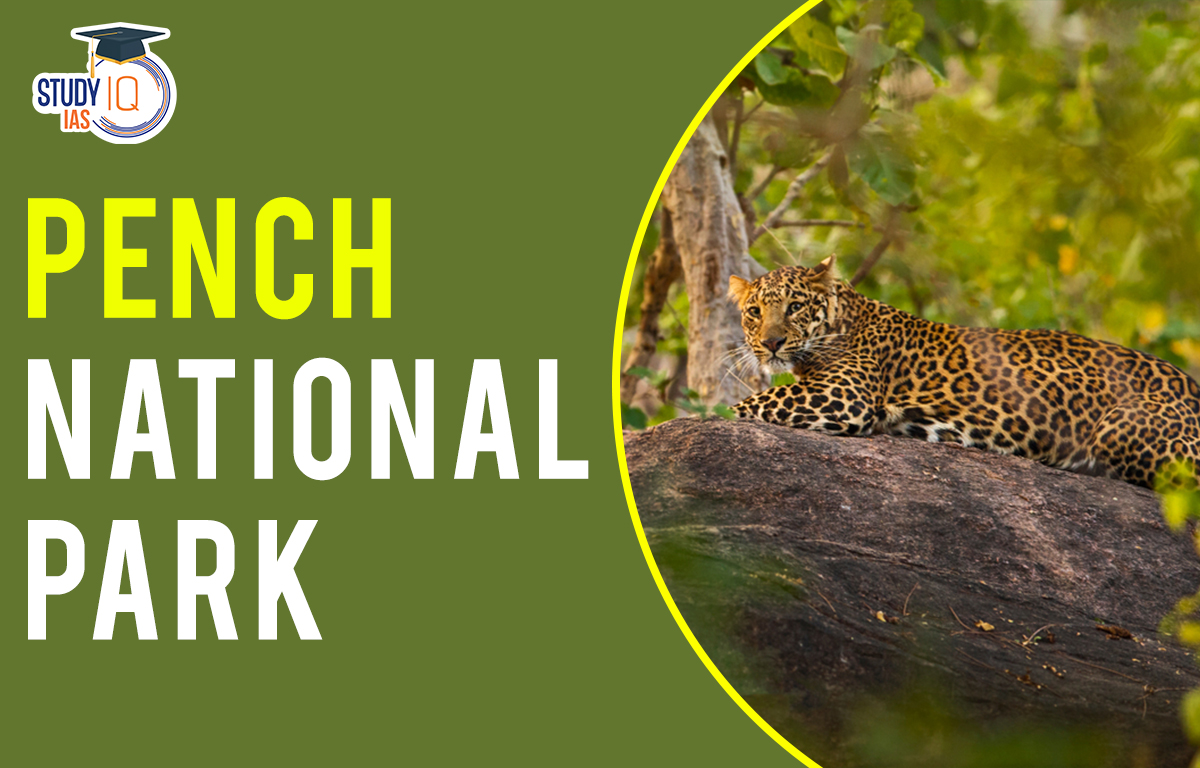Table of Contents
Pench National Park
The Indian districts of Chhindwara and Seoni in Madhya Pradesh contain Pench National Park. The name was derived from the Pench River, which runs through the National Park. As it flows from north to south, the river divides the park into equal eastern and western halves, the well-wooded areas of both districts. There are many different kinds of animals in the park, like wild guars, tigers, leopards, monkeys, deer, and others. It is a crucial part of the UPSC Syllabus. The UPSC Mock Test can help candidates prepare for the exam with more precision.
Pench National Park History
Pench Public Park was laid out as a safe haven in 1977, yet it was raised to Public Park status in 1983. Afterwards, in 1992, it was assigned as the PenchTiger Hold, which traverses 758 square kilometres and incorporates the Pench Public Park, which traverses 292.85 square kilometres, and the Mowgli Pench Natural Life Safe-haven, which traverses 118.30 square kilometres. Save Timberlands, Income Land, and Safeguarded Backwoods make up a 346.73-square-kilometre cradle zone.
Pench National Park has a long and renowned history. The magnificence and natural wealth of Emperor Akbar’s administration empire are depicted in the document known as the Ain-i-Akbari (Constitution of Akbar), which was written in the 16th century by Abu’l-Fazl ibn Mubarak, who was the vizier of Emperor Akbar. The popular book “The Jungle Book” by Rudyard Kipling was based on Pench.
Also read: Kanha National Park
Pench National Park Vegetation
In the park’s forest cover, teak coexists with other species like saja, bijiayasal, lendia, haldu, dhaora, salai, amla, and amaltas. The ground is covered in a web of grasses, plants, bushes, and saplings. Additionally, bamboo can be found in some places. The scattered white Kulu trees, also known as “ghost trees,” stand out among the various shades of green. In this region, the mahua is another important tree for tribal people and wildlife. Well-evolved creatures and birds eat the blossoms of this tree, which are additionally reaped by ancestral individuals for food and larger blending.
Also Read: Kuno National Park
Pench National Park Wildlife
The diverse fauna of Pench National Park is home to a number of threatened species. The Tiger is the most prevailing hunter in these prey-rich forests, with around 25 of them. Other predators include the dhol (Indian wild dog), leopard, hyena, wolf, jackal, and jungle cat. Predators that can be found in the park include rhesus macaques, sambhar, chital, gaur, muntjac, langur, wild boar, and rhesus macaques. A herd of deer is frequently seen.
There are over 170 species of birds, including peafowl, crow pheasants, junglefowl, red-vented bulbul, crimson-breasted barbet, magpie robin, lesser whistling teal, racket-tailed drongo, egret, pintail, shoveler, and herons, which are all migratory birds. The park is home to 25 tigers, 39 mammals, 13 reptiles, and three amphibians, according to a study done in the first year. The park is home to a wide variety of bird species in addition to mammals and other land-based flora and fauna. According to wildlife authorities, 210 species of birds, including munias, barbets, minivet orioles, bulbul, waterfowl, wagtails, mynas, and blue kingfishers, were observed in this park.
Pench National Park Flora and Fauna
The reserve is covered in a thick layer of green vegetation. A combination of Southern dry broadleaf teak woods and tropical blended deciduous woodlands is available. Trees, climbers, and shrubs are also prevalent. Some of them are one-of-a-kind varieties with healing and medicinal properties. Additionally, there are bamboo plantations nearby. Sloth bears, jackals, nilgai, wild dog, and others make up the fauna. It includes peafowl, magpie robin, pintail, drongo, unia, myna, and other birds in the mammal’s category.
Pench National Park UPSC
Established in 1975, Pench National Park is a 257.26 km2 national park in India’s Madhya Pradesh state. Maharashtra and Nagpur are both within easy driving distance of the park, which is on National Highway 7 near Pauni. Two of the most well-known tourist entrance gates are Turiya and Karmajhiri. Students can read all the details related to UPSC by visiting the official website of StudyIQ UPSC Online Coaching.


 Purchasing Power Parity Index, How to Ca...
Purchasing Power Parity Index, How to Ca...
 Unemployment Rate in India, Current Rate...
Unemployment Rate in India, Current Rate...
 RBI Monetary Policy Committee: Repo Rate...
RBI Monetary Policy Committee: Repo Rate...

























